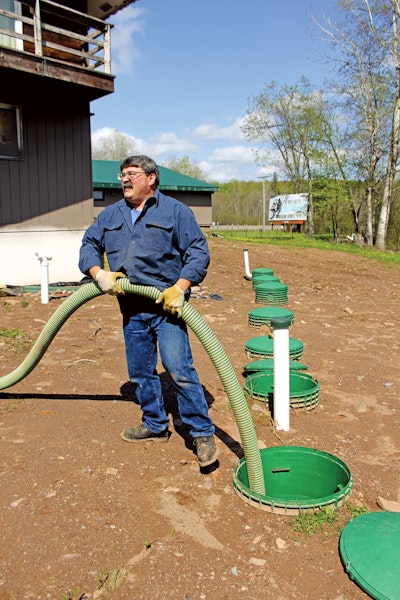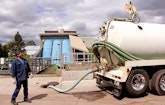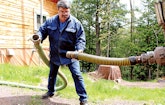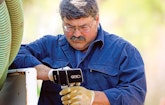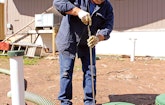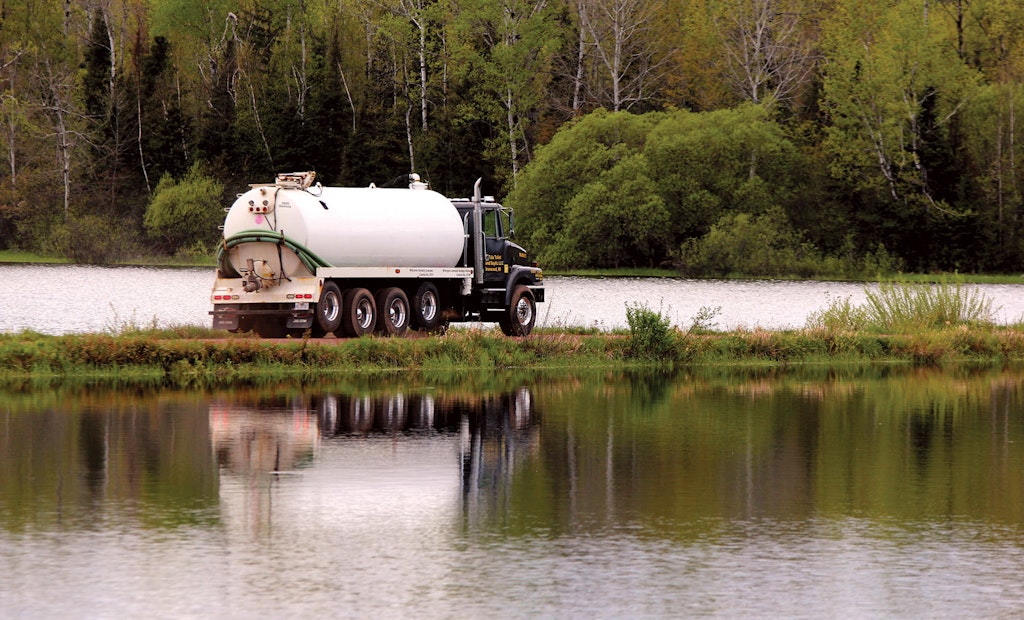
Interested in Pumps?
Get Pumps articles, news and videos right in your inbox! Sign up now.
Pumps + Get AlertsDuring the summer and early fall, Bill Leppala appreciates the beauty of the lakes, rivers, woods and landscapes in Michigan’s Upper Peninsula where he pumps tanks and services restrooms. But for about seven months each year, he faces nature’s other side — 200 inches of snow and a slow thaw that forces up to 90 days of road restrictions.
His territory is on the western edge of the UP and northern Wisconsin. Despite the challenges in this sparsely populated and economically challenged area, Leppala takes pride that he provides services year-round in the region around Ironwood, Michigan, and Hurley, Wisconsin. And though it can be an uncertain way to make a living, owning Tula Toilet and Septic offers an opportunity to work independently. More importantly, he can work out of his home and spend more time with his wife and daughter.
TRUCKING TO PUMPING
Leppala has made a living in Upper Michigan in a variety of ways. He had been an over-the-road trucker for seven years when he decided to buy a pumping/portable restroom business in 2010.
“I was driving 290 days a year away from home. My daughter was 3 years old. It was just time to get off the road. There’s not much (for work) around here, and being my own boss has some advantages,” Leppala explains.
His friend’s father owned a salvage yard and had a pumping business on the side. He was ready to sell. Leppala rode along in the truck with his friend and attended Department of Environmental Quality classes downstate in Kalamazoo to earn initial credits for licensure in Michigan. He attended a Wisconsin Department of Natural Resources master pumper certification class to work across the border. He also attended Private Onsite Wastewater Treatment System Evaluator Certification Training through the Wisconsin Onsite Water Recycling Association.
He renamed the business Tula Toilet and Septic, a catchy name in the Finnish-populated area that refers to a rough-and-tumble logging camp about 20 miles from Ironwood.
“I started with 19 portable restrooms and a 1989 GMC truck. The first year, I was pumping restrooms with the tri-axle truck,” Leppala says.
He recognized the potential for growing the restroom side of the business and invested in a Ford truck with a slide-in tank and started adding a few restrooms each spring.
REMOTE ROUTES
When the mining industry was booming, the Ironwood and Hurley area had 50,000 people. Now, about 16,000 are scattered throughout Leppala’s coverage area — mostly in Gogebic County in Michigan and Iron County in Wisconsin.
His days of driving log trucks and having more than a million miles behind the wheel of a semitruck come in handy when he backs up long, narrow driveways to get close enough to pump. His pickup setup comes in handy for driving up to Michigan’s Copper Peak — once the highest ski-flying (an individual sport derived from ski jumping) hill in world, and now one of only six ski-flying hills outside of Europe — to set up a couple of portable restrooms for hikers in the summer. The pickup is also ideal for driving to Michigan’s Porcupine Mountains to service vault restrooms for the state.
Many of the septic systems he pumps were installed after World War II and are gravity-fed and ditch-discharged. Holding tanks are also common among his lake cabin customers. Regularly scheduled pumping — as often as once a month — provides a good chunk of income from residential customers.
“Hell week is between Christmas and New Years when we have a tourist boom and things break,” Leppala says. Holding tanks need to be pumped, and he stays busy until about mid-January with minor repairs, including fixing pumps.
EQUIPMENT AND MAINTENANCE
Leppala doesn’t have a big budget for new equipment, but he has a good sense for quality used equipment. As a former military mechanic, he isn’t afraid to tackle modifications and repairs. As a one-man operation, Leppala does it all.
He still has the 1989 GMC Topkick tri-axle Field Gymmy Inc. vacuum truck with a 4,000-gallon steel tank and Jurop/Chandler R260 pump. It is currently a backup truck that he may sell in the future.
His main service truck is a 1996 Volvo WG64 quad-axle with a T-Line Equipment 5,500-gallon steel tank and Battioni MEC 8000 pump. He discovered it in Wisconsin at the 2017 Wisconsin Onsite Water Recycling Association/Wisconsin Liquid Waste Carriers Association Joint Winter Conference and liked its low mileage (164,000), large size and excellent condition due to being stored inside and maintained by city employees for municipal work. “It has a short turning base and maneuvers well,” Leppala notes.
A 1988 Chevy V3500 pickup with a twin-winch hydraulic boom and E.R. Buske Manufacturing wrecker bed comes in handy for a number of jobs, including lifting 5-inch-thick, 4-foot-diameter tank covers.
The 1997 Ford Super Duty pickup has a 12-foot Monroe flatbed with a Larson 500-gallon steel tank. He also has a pressure washer and freshwater pump with a 270-gallon freshwater tote.
The truck easily pulls the 8-by-10-foot snowmobile trailer that Leppala uses to transport portable restrooms. The trailer holds six regular restrooms or a handicap restroom and two regular restrooms at a time, which is usually plenty for even the biggest events he handles.
Though he buys used equipment, Leppala has built a reputation for having nice restrooms. In addition to the restrooms he started with, he has units from Satellite Industries and Five Peaks. Except for one gray unit, all are blue and white.
Though he doesn’t have specialty units, he came up with a “Kings and Queens” package for events like weddings. He ordered two restrooms without urinals, which are generally appreciated by women. Paired with regular restrooms for men and a couple of hand-wash stations, the setup is popular.
Leppala is making repairs on his most recent purchase — a 2004 Chevy C3500 pickup with an 800-gallon waste and 200-gallon freshwater steel tank and Masport HX2 pump. When he purchased it, he knew it needed suspension work, replumbing, and repairs on the portable restroom platform on the back.
Finally, Leppala is known to get around with eco-friendly transportation: a seven-speed Schwinn bicycle. “Ironwood has a festival with no room to get a truck there to service seven restrooms,” he says. “I live 3/4 of a mile away and ride the bike to change out the toilet paper and wipe them down.”
Another “atmosphere-pleasing” product Leppala is sold on is cherry-scented Surco Portable Sanitation Products Fresh Lube pump oil additive. He decided to try it after he pumped vault toilets and the nasty odors lingered around his truck for a week. “It has made a big difference. I don’t like being without (the cherry scent),” he says.
SOCIAL MEDIA CONNECTIONS
Leppala doesn’t spend a lot on advertising. Word-of-mouth, his catchy business name and his number in yellow on the trucks provide much of the business’s promotion. He also does limited newspaper advertising.
Tula Toilets and Septic doesn’t have a website, but Leppala posts frequently on its Facebook page. He says it’s handy for education and reminders to customers about the $30 winter surcharge or when road restrictions are on and a $10 permit will be required. The extra fees encourage customers to plan ahead for servicing septic tanks during better weather in the summer or fall. (He doesn’t charge extra for customers who need frequent pumping from a holding tank.)
In addition to practical information on Facebook, Leppala posts photos of some of the unique locations he services, such as the popular SISU cross-country ski race that drew more than 750 registrants last year.
IT’S ALL ABOUT THE WEATHER
“My biggest difference compared to most pumpers is the weather here,” Leppala says.
In late September, he prepares for winter by stowing tire chains in his truck.
“Some of the holding tanks are at the end of driveways with a 7 to 10 percent incline, and we can have 6- to 12-inches of snowpack,” Leppala says. He had put on and removed the chains five times last winter before the end of December.
Because he doesn’t close down during the winter like other pumpers in the area, he has some work to earn income. He has provided restrooms for the city of Ironwood and pumps a restaurant’s 10,000-gallon holding tank weekly.
When the snow starts to melt, road restrictions require him to get permits that allow him to haul at low speed and for limited use. Restrictions can stay on for more than 90 days.
When spring finally comes, so do the bugs. With long sleeves and bug sprays that contain a high DEET content, Leppala says he has learned to deal with biting insects.
READY FOR MORE WORK
Tula Toilets and Septic has become a recognizable name over the few years Leppala has owned the business. He answers the phone, services restrooms as promised and is available for emergencies. He charges more than some competitors and that means he has lost some local bids to provide restrooms. Still, he sees potential in portable restrooms and commercial opportunities.
QuickBooks help him with bookwork while Google Maps on his smartphone provides directions in new territory. In his spare time, he is working on a database for his Michigan customers so he can send reminder cards. Wisconsin customers receive cards from the county.
Because most of the work gets crammed in during a few months, work can get hectic for the one-man operation. For now, he recognizes that work done between July 1 and Thanksgiving provides the income to tide the business over through the slower months. Business starts to pick up in the spring enough to maintain cash flow.
“I’ve kicked around the idea of hiring somebody, but I really need 35 to 40 percent more business,” he explains. “The numbers have to match.”
Traveling for CEUs
Owning a pumping business in the wilds of Michigan’s Upper Peninsula, 425 miles from your state’s capital and even farther from where most classes are held, can make certification tricky, says Bill Leppala.
Fortunately, he lives near Wisconsin where he can attend the Wisconsin Onsite Water Recycling Association and Wisconsin Liquid Waste Carriers Association Joint Winter Conference to earn credits for both Michigan and Wisconsin. This year’s conference was in the Wisconsin Dells, Wisconsin, about 225 miles away. By attending, he can obtain the credits necessary for each state (30 credits every five years in Michigan, and 12 credits plus three compliance credits every three years in Wisconsin).
Wisconsin is specific about compliance and filling out paperwork in a certain way, Leppala says. And he finds the conference helpful for that. He also finds risk management and OSHA compliance sessions especially helpful and good reminders about how to protect himself as a business owner.
Because he works in two states, keeping up with the regulations and certifications can be challenging, Leppala admits. Having the states work together to preapprove workshops makes that easier.
Leppala adds that he gets much of his education from a source every pumper can access. “Networking online has changed the game. I learn a lot on forums. You’re not in competition, and it’s like going to a conference every day,” he says. One forum discussion gave him the idea to use restrooms without urinals for his “Kings and Queens” restroom package.
